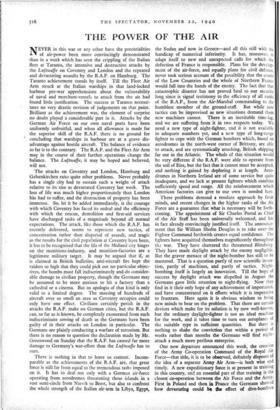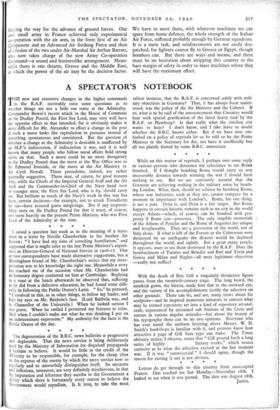THE POWER OF THE AIR
NEVER in this war or any other have the potentialities of air-power been more convincingly demonstrated than in a week which has seen the crippling of the Italian fleet at Taranto, the intensive and destructive attacks by the Luftwaffe on Coventry and London and the repeated and devastating assaults by the R.A.F. on Hamburg. The Taranto achievement stands by itself. Till the Fleet Air Arm struck at the Italian warships in that land-locked harbour pre-war apprehensions about the vulnerability of naval and merchant-vessels to attack from the air had found little justification. The success at Taranto necessi- tates no very drastic revision of judgements on that point. Brilliant as the achievement was, the element of surprise no doubt played a considerable part in it. Attacks by the German Air Force on our own naval ports have been uniformly unfruitful, and when all allowance is made for the superior skill of the R.A.F. there is no ground for concluding that warships in harbour are at a grave dis- advantage against hostile aircraft. The balance of evidence so far is to the contrary. The R.A.F. and the Fleet Air Arm may in the course of their further operations change the balance. The Luftwaffe, it may be hoped and believed, will not.
The attacks on Coventry and London, Hamburg and Gelsenkirchen raise quite other problems. Never probably has a single city had to sustain such a weight of attack relative to its size as devastated Coventry last week. The loss of life was much higher proportionately than London has had to suffer, and the destruction of property has been immense. So, let it be added immediately, is the courage with which Coventry has faced its ordeal and the efficiency with which the rescue, demolition and first-aid services have discharged tasks of a magnitude beyond all normal expectations. The attack, like those which the R.A.F. has recently delivered, seems to represent new tactics, of concentration rather than dispersal of assault, and tragic as the results for the civil population at Coventry have been, it has to be recognised that the life of the Midland city hinges on the munitions-industry, and munition-factories are a legitimate military target. It may be argued that if, as is claimed in British bulletins, anti-aircraft fire kept the raiders so high that they could pick out no particular objec- tives, the bombs must fall indiscriminately and do consider- able damage to civilian property, though the Germans may be assumed to be more anxious to hit a factory than a cathedral or a cinema. But an apologia of that kind is only valid to a limited degree. The massing of hundreds of aircraft over so small an area as Coventry occupies could only have one effect. Civilians certainly perish in the attacks the R.A.F. make on German cities, but the R.A.F. can, so far as is known, be completely exonerated from such indiscriminate sowing of death as the Germans have been guilty of in their attacks on London in particular. The Germans are plainly conducting a warfare of terrorism. But there is no reason to question the declaration made by Mr. Greenwood on Sunday that the R.A.F. has caused far more damage to Germany's war-effort than the Luftwaffe has to ours.
There is nothing in that to leave us content. Incom- parable as the achievements of the R.A.F. are, that great force is still far from equal to the tremendous tasks imposed on it. It has to deal not only with a German air-force operating from aerodromes threatening these islands in a vast semi-circle from Narvik to Brest, but also to confront the whole strength of the Italian air-arm in Libya, Egypt, the Sudan and now in Greece—and all this still with the handicap of numerical inferiority. It has, moreover, to adapt itself to new and unexpected calls for which the defection of France is responsible. Plans for the develop- ment of the air-force, and equally plans for civil defence, never took serious account of the possibility that the coasts of the Low Countries and the whole of Northern France would fall into the hands of the enemy. The fact that that catastrophic disaster has not proved fatal to our security long since is signal testimony to the efficiency of all ranks of the R.A.F., from the Air-Marshal commanding to the humblest member of the ground-staff. But while new tactics can be improvised as new situations demand them new machines cannot. There is an inevitable time-lag, and we are suffering from it in two respects today. We need a new type of night-fighter, and it is not available in adequate numbers yet, and a new type of long-range fighter to cope with the German bombers which, based on aerodromes in the north-west corner of Brittany, are able to attack, and are systematically attacking, British shipping far out in the Atlantic. The whole of this situation would be very different if the R.A.F. were able to operate from the soil of Eire, but the fact that it cannot must be accepted, and nothing is gained by deploring it at length. Aero- dromes in Northern Ireland are of some service but quite inadequate, and we lack at present fighters which combine sufficiently speed and range. All the reinforcement which American factories can give to our own is needed here.
These problems demand a resolute approach by fresh minds, and recent changes in the higher ranks of the Air Force are a guarantee that what is necessary will be forth- coming. The appointment of Sir Charles Portal as Chief of the Air Staff has been universally welcomed, and has in fact already convincingly justified itself. The announce- ment that Sir William Sholto Douglas is to take over the Fighter Command forthwith creates equal confidence. The fighters have acquitted themselves magnificently throughout the war. They have shattered the threatened Blitzkrieg. They have made daylight attack by the enemy negligible. But the graver menace of the night-bomber has still to be mastered. That is a question partly of new scientific inven- tion, partly of machines, and partly of tactics. Night- bombing itself is largely an innovation. Till the hope of success by daylight attack was dispelled in August the Germans gave little attention to night-flying. Now they find in it their only hope of any achievement of importance, and have concentrated on it efforts which it is imperative to frustrate. Here again it is obvious wisdom to bring new minds to bear on the problem. That there are certain devices which make for its solution is by now well-known, but the ordinary daylight-fighter is not an ideal machine for the work, and it takes time to turn out aeroplanes of the suitable type in sufficient quantities. But there is nothing to shake the conviction that within a period of weeks rather than months the Germans will find night attack a much more perilous enterprise.
One new departure announced this week, the creation of the Army Co-operation Command of the Royal Air Force—that title, it is to be observed, definitely disposes of the idea of a separate Army Air Arm—is both wise and timely. A new expeditionary force is at present in training in this country, and an essential part of that training is the closest co-operation between the Air Force and the Army. First in Poland and then in France the Germans showed how devastating could be dic effect of dive-bombers blasting the way for the advance of ground forces. Our own small army in France achieved only experimental co-operation with the air arm, in the form first of an Air Component and an Advanced Air Striking Force and then of a fusion of the two under Air-Marshal Sir Arthur Barratt, who now takes charge of the new Army Co-operation Command—a sound and businesslike arrangement. Mean- while there is one theatre, Greece and the Middle East, in which the power of the air may be the decisive factor. We have to meet there, with whatever machines we can spare from home defence, the whole strength of the Italian Air Force, stiffened probably enough by German squadrons. It is a stern task, and reinforcements are not easily des- patched, for fighters cannot fly to Greece or Egypt, though bombers can. But there are ways and means, and there must be no hesitation about stripping this country to the bare margin of safety in order to mass machines where they will have the maximum effect.



























































 Previous page
Previous page